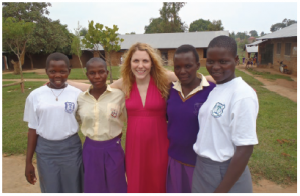
Ruth talks about her gratitude for the Aninga Project which, she says, has brought profound change into her life: “It has been a wonderful achievement and success since you started paying my school fees, which gave me a clear vision of becoming an accountant and successful financial manager. You gave me hope.”
The Aninga Project is a tiny non-profit initiative working to educate and empower young women in Uganda and change the way East Africa views the education of females. These are challenging objectives indeed. However, in the past 11 years, we have managed to help get 22 girls into school, two of whom have completed university degrees and have become change-makers in their communities. Little by little, we are helping to change the narrative about the education of females in northern Uganda.
The Aninga Project is a Canadian charity and Ugandan NGO based in Timberlea, N.S., and Kampala, Uganda. We are 100 per cent volunteer-based. Our Canadian team of volunteers raises the funds needed for our Ugandan volunteers to ensure our girls are fully supported. When we commit to a girl, we support her fully by paying her school fees, boarding fees, transportation costs, food, water, medicine and much more. We also commit to supporting her entire education, including through the post-secondary level.
The Aninga Project is proof that a few people with a great idea can create positive change. Our organization was born of a friendship between my family — the Bensons — and a young Zimbabwean woman we met through her participation in the 2006 International AIDS Conference in Toronto. When our friend, Constance Shumba, settled in Uganda with her Ugandan husband, Gershim Asiki, they asked if we could work together at a grassroots level to create educational opportunities for a young woman.
Shumba and Asiki identified a girl named Aninga who could benefit from the money my family sent from Canada. It was to be disbursed by them for her school fees and other necessities. Aninga’s northern Ugandan village is close to the Democratic Republic of Congo and Sudan — a dangerous area with little infrastructure. Educational opportunities are scarce and, for females, they’re virtually non-existent. This opportunity was life-changing for Aninga.
After I met with Aninga in Uganda and learned about the positive impact our sponsorship had had, my family and I knew our little initiative required expansion. In 2009, The Aninga Project was born and took steps to become incorporated and gain charitable status in Canada and Uganda. It grew from supporting Aninga, who is now a community development officer working in northern Uganda, to supporting five girls in the first year. It currently supports 22.
The Aninga Project showcases every day what a true grassroots international partnership can accomplish. Our Ugandan volunteers monitor the young women we support, providing our Canadian volunteers with information and Ugandan context. Together, we make decisions that are the best, healthiest and most relevant for the young women we support and fundraise accordingly in Canada.
The first time I met Aninga, I learned that she had been using her allowance money to send her sister to school. While many of the girls we support are the first girls in their families to attend school beyond Grade 4, we are learning that their siblings (male and female) are following in their footsteps. In many parts of East Africa, young women are viewed as commodities; they can be used for labour or married in exchange for money or livestock. The young women we are supporting are changing that narrative as they gain education and skills to support themselves and their families.
Educators and community leaders in Northern Uganda were initially wary of what we were up to, but, having seen some success, they are now encouraging us to support more girls. There seems to be growing recognition of the value of educating girls, though it remains a fact that once a girl cannot go to school, she will be married off. We hope for a world where marriage is a choice at an appropriate age, not an obligatory commodity exchange.
Working in an under-resourced area surrounded by conflict involves anxiety, frustration and sometimes even danger; however, the young women we support and the opportunities we provide to them are more than a worthy counter-balance to the challenge.
Jenny Benson is president of The Aninga Project.





